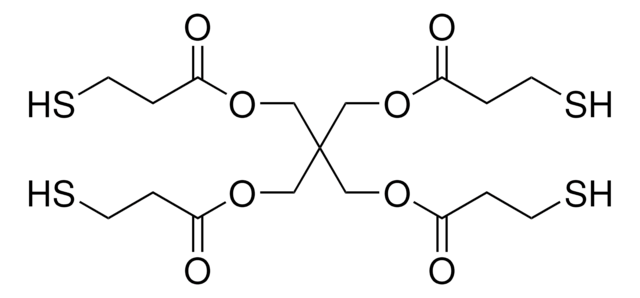123315
1,4-Butanediol divinyl ether
98%
Synonyme(s) :
1,4-Bis(vinyloxy)butane, 1,4-Butylene glycol divinyl ether, 1,4-Divinyloxybutane
About This Item
Produits recommandés
Niveau de qualité
Pureté
98%
Indice de réfraction
n20/D 1.444 (lit.)
Point d'ébullition
62-64 °C/10 mmHg (lit.)
Pf
−8 °C (lit.)
Densité
0.898 g/mL at 25 °C (lit.)
Chaîne SMILES
C=COCCCCOC=C
InChI
1S/C8H14O2/c1-3-9-7-5-6-8-10-4-2/h3-4H,1-2,5-8H2
Clé InChI
MWZJGRDWJVHRDV-UHFFFAOYSA-N
Catégories apparentées
Description générale
Application
- Comparative physicochemical analysis among 1, 4-butanediol diglycidyl ether cross-linked hyaluronic acid dermal fillers: This study explores the properties of hyaluronic acid dermal fillers cross-linked with 1,4-butanediol diglycidyl ether, focusing on their physicochemical characteristics and performance in cosmetic applications (Zerbinati et al., 2021).
- In-depth characterization of 1, 4-butanediol diglycidyl ether substituted hyaluronic acid hydrogels: An investigation into the properties of hyaluronic acid hydrogels modified with 1,4-butanediol diglycidyl ether, providing insights into their structural and functional enhancements (Zhang et al., 2023).
- Highly Branched Poly(5-amino-1-pentanol-co-1,4-butanediol diacrylate) for High Performance Gene Transfection: Discusses the synthesis and application of a novel branched polymer for gene delivery, highlighting the role of 1,4-butanediol diacrylate in enhancing transfection efficiency (Zeng et al., 2017).
- Tuning thermal, morphological, and physicochemical properties of thermoplastic polyurethanes (TPUs): This study examines the effects of substituting 1,4-butanediol in the synthesis of TPUs, aiming to improve their mechanical properties and performance (Ernzen et al., 2022).
- Cyclodehydration of 1, 4-butanediol over Zr-Al Catalysts: Focuses on the catalytic transformation of 1,4-butanediol to tetrahydrofuran, a critical industrial solvent and intermediate, using zirconium-aluminum catalysts (Li & Chen, 2019).
Mention d'avertissement
Warning
Mentions de danger
Conseils de prudence
Classification des risques
Aquatic Chronic 2 - Flam. Liq. 3 - Skin Sens. 1B
Risques supp
Code de la classe de stockage
3 - Flammable liquids
Classe de danger pour l'eau (WGK)
WGK 2
Point d'éclair (°F)
139.1 °F - closed cup
Point d'éclair (°C)
59.5 °C - closed cup
Équipement de protection individuelle
Eyeshields, Gloves, type ABEK (EN14387) respirator filter
Faites votre choix parmi les versions les plus récentes :
Déjà en possession de ce produit ?
Retrouvez la documentation relative aux produits que vous avez récemment achetés dans la Bibliothèque de documents.
Notre équipe de scientifiques dispose d'une expérience dans tous les secteurs de la recherche, notamment en sciences de la vie, science des matériaux, synthèse chimique, chromatographie, analyse et dans de nombreux autres domaines..
Contacter notre Service technique











